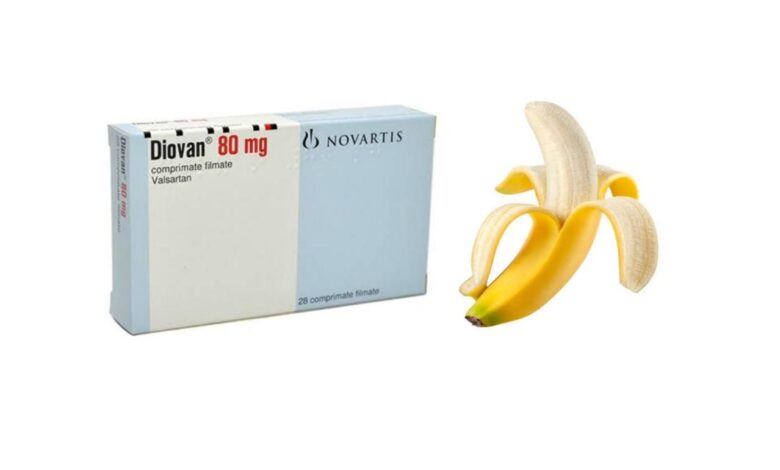Can I Eat Bananas When Taking Valsartan?

What is valsartan?
Valsartan (Diovan) is an angiotensin II receptor blocker (sometimes called an ARB). Valsartan is used to treat high blood pressure (hypertension) in adults and children who are at least 1 year old. Lowering blood pressure may lower your risk of a stroke or heart attack. Valsartan is also used in adults to treat heart failure and lower your risk of needing to be hospitalized and lower your risk of death after a heart attack.
How should this medicine be used?
Valsartan comes as a tablet and a suspension (liquid) to take by mouth. For the treatment of high blood pressure, the tablet or suspension is usually taken once a day with or without food. For the treatment of heart failure or heart attack, it is usually taken twice a day with or without food. To help you remember to take valsartan, take it at around the same time(s) every day. Follow the directions on your prescription label carefully, and ask your doctor or pharmacist to explain any part you do not understand. Take valsartan exactly as directed. Do not take more or less of it or take it more often than prescribed by your doctor.
Shake the suspension well for at least 10 seconds before each use to mix the medication evenly.
Each valsartan product releases the medication differently in your body and cannot be used interchangeably. Only take the valsartan product prescribed by your doctor and do not switch to a different valsartan product unless your doctor says that you should. Your doctor will probably only tell you to take valsartan suspension if you are younger than 5 years of age or unable to swallow tablets.
Your doctor may start you on a low dose of valsartan and gradually increase your dose.
Valsartan controls high blood pressure and heart failure but does not cure them. Your blood pressure may decrease during the first 2 weeks of your treatment, but it may take 4 weeks for you to notice the full benefit of valsartan. Continue to take valsartan even if you feel well. Do not stop taking valsartan without talking to your doctor.
Ask your pharmacist or doctor for a copy of the manufacturer’s information for the patient.
What you should Know about Bananas
Bananas are most commonly known for being a good source of potassium, but as per the U.S. Department of Agriculture’s MyPlate guidelines, their nutritional worth doesn’t end there. In fact, this fruit is packed with a plethora of vitamins and minerals that are essential to your health, making them one of the world’s most appealing superfoods.
According to U.S. Department of Agriculture (USDA) calculations, which are based on a 2,000-calorie diet, a medium-sized banana contains only 105 calories. Although it seems obvious that these fruits are a relatively healthy snack, they get a bad reputation because of the large number of carbohydrates they have: 27 grams (g) for a medium-sized banana.
Bananas are a great food to eat when you’re sick. They’re soft and bland but rich in nutrients and fast-acting carbs. The potassium in bananas can help replenish your electrolyte stores as well since potassium is one of the key electrolytes your body needs.
Can I take Valsartan and Bananas Together?
No, you should limit or avoid taking Valsartan and banana together because of their high potassium content which can cause the body to retain excess potassium that would otherwise be flushed out by the kidneys.
While potassium is important to your health, getting too much of the nutrient can be just as bad as, or worse than, not getting enough. Normally, your kidneys keep a healthy balance of potassium by flushing excess potassium out of your body. When Valsartan and bananas increase the level of potassium in your blood it is called hyperkalemia, or high potassium.
According to the Mayo Clinic, a normal range of potassium is between 3.6 and 5.2 millimoles per liter (mmol/L) of blood. A potassium level higher than 5.5 mmol/L is critically high, and a potassium level over 6 mmol/L can be life-threatening. Small variations in ranges may be possible depending on the laboratory.
Whether you have mild or severe hyperkalemia, you should get prompt medical attention to prevent possible complications.





